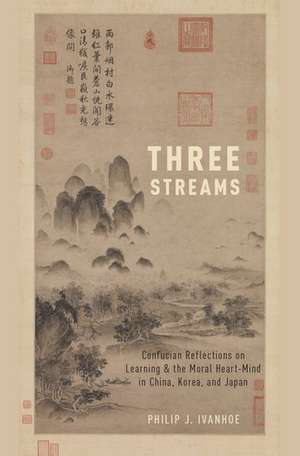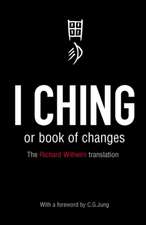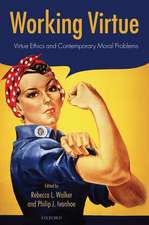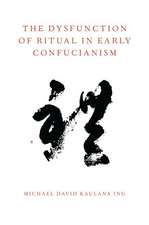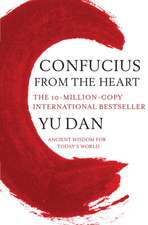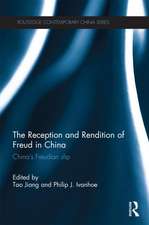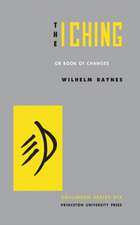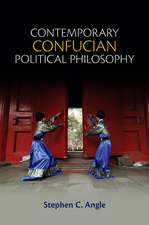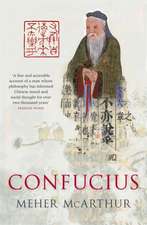Three Streams: Confucian Reflections on Learning and the Moral Heart-Mind in China, Korea, and Japan
Autor Philip J. Ivanhoeen Limba Engleză Hardback – 17 noi 2016
Preț: 583.76 lei
Preț vechi: 792.42 lei
-26% Nou
Puncte Express: 876
Preț estimativ în valută:
111.70€ • 116.63$ • 92.24£
111.70€ • 116.63$ • 92.24£
Carte tipărită la comandă
Livrare economică 04-10 aprilie
Preluare comenzi: 021 569.72.76
Specificații
ISBN-13: 9780190492014
ISBN-10: 0190492015
Pagini: 262
Dimensiuni: 155 x 241 x 28 mm
Greutate: 0.68 kg
Editura: Oxford University Press
Colecția OUP USA
Locul publicării:New York, United States
ISBN-10: 0190492015
Pagini: 262
Dimensiuni: 155 x 241 x 28 mm
Greutate: 0.68 kg
Editura: Oxford University Press
Colecția OUP USA
Locul publicării:New York, United States
Recenzii
The book is, indeed, an interestingly written, accessible scholarly work that can be warmly recommended to both general readers and to the specialists of East Asian religions and cultural traditions.
Philip J. Ivanhoe's Three Streams is a brillant book of striking breadth and depth.
It is to Ivanhoe's credit that he has managed to introduce, in a compact form, key ideas from a number of important East Asian Neo-Confucian thinkers and their critics. If the details of Neo-Confucianism are not as well known in the English-speaking world as the works of the early or classical Confucians (e.g., Confucius, Mencius and Xúnz&i), the works of the Korean and Japanese Neo-Confucians are even less so. Ivanhoe's book adds to the accessibility of these traditions...And this is an achievement in its own right.
The East Asian philosophical tradition is one of the most sophisticated and powerful in world history, yet only a limited number of philosophers from the tradition have been introduced to a Western audience. In this wide-ranging work, Ivanhoe explores the richness of Confucian philosophy across China, Japan, and Korea from the tenth through nineteenth centuries. Ivanhoe succeeds in demonstrating the complexity and subtlety of the tradition, while presenting it in a clear and accessible language. A truly exceptional work.
Three Streams is an artistic and philosophical masterpiece. Ivanhoe traces the legacy of Mengzi's theory of the four moral sprouts over two millennia into the heart of Chinese, Korean, and Japanese lived philosophy. The inspired, poetic translations are all Ivanhoe's, and the lessons of these three streams for contemporary naturalistic ethics and moral psychology are plentiful. Three Streams is an exemplary work in cross-cultural philosophy.
Philip J. Ivanhoe, unlike most scholars who cannot be immersed in Chinese, Japanese, and Korean traditions at the same time, makes a great contribution to the introduction of Confucian philosophy in the East Asian context by juxtaposing three great traditions and analyzing the key concepts embedded in these traditions. Not every major Confucian philosopher in Chinese, Japanese, and Korean history is tackled, but relevant historical figures and their philosophical reflections on learning and the moral heart-mind are seamlessly interwoven into the narratives and arguments of this book.
Philip J. Ivanhoe's Three Streams is a brillant book of striking breadth and depth.
It is to Ivanhoe's credit that he has managed to introduce, in a compact form, key ideas from a number of important East Asian Neo-Confucian thinkers and their critics. If the details of Neo-Confucianism are not as well known in the English-speaking world as the works of the early or classical Confucians (e.g., Confucius, Mencius and Xúnz&i), the works of the Korean and Japanese Neo-Confucians are even less so. Ivanhoe's book adds to the accessibility of these traditions...And this is an achievement in its own right.
The East Asian philosophical tradition is one of the most sophisticated and powerful in world history, yet only a limited number of philosophers from the tradition have been introduced to a Western audience. In this wide-ranging work, Ivanhoe explores the richness of Confucian philosophy across China, Japan, and Korea from the tenth through nineteenth centuries. Ivanhoe succeeds in demonstrating the complexity and subtlety of the tradition, while presenting it in a clear and accessible language. A truly exceptional work.
Three Streams is an artistic and philosophical masterpiece. Ivanhoe traces the legacy of Mengzi's theory of the four moral sprouts over two millennia into the heart of Chinese, Korean, and Japanese lived philosophy. The inspired, poetic translations are all Ivanhoe's, and the lessons of these three streams for contemporary naturalistic ethics and moral psychology are plentiful. Three Streams is an exemplary work in cross-cultural philosophy.
Philip J. Ivanhoe, unlike most scholars who cannot be immersed in Chinese, Japanese, and Korean traditions at the same time, makes a great contribution to the introduction of Confucian philosophy in the East Asian context by juxtaposing three great traditions and analyzing the key concepts embedded in these traditions. Not every major Confucian philosopher in Chinese, Japanese, and Korean history is tackled, but relevant historical figures and their philosophical reflections on learning and the moral heart-mind are seamlessly interwoven into the narratives and arguments of this book.
Notă biografică
Philip J. Ivanhoe (Ph.D. Stanford University) is Chair Professor of East Asian and Comparative Philosophy and Religion at City University of Hong Kong, where he also serves as director of the Center for East Asian and Comparative Philosophy (CEACOP), the Laboratory on Korean Philosophy in Comparative Perspectives, and the project Eastern and Western Conceptions of Oneness, Virtue, and Human Happiness. He specializes in the history of East Asian philosophy and religion and its potential for contemporary ethics.
